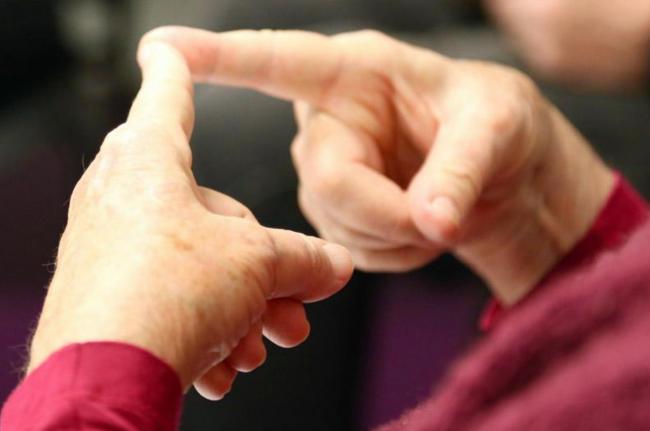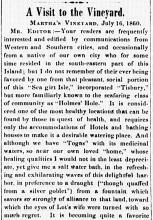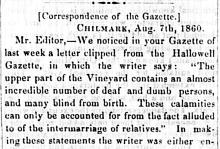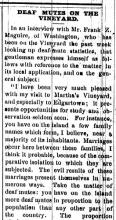There were several deaf-and-dumb persons, as deaf-mutes were called, living in the Island towns. Although all of them were considered educated and could read and write, none of them depended upon this method of communicating with one another or with their more fortunate neighbors, but used the sign language. As a result, almost everyone old and young could converse to some extent with the deaf-mutes, and many could use the sign alphabet and spell out words and names for which there were no signs.
The ability to converse in this manner was highly convenient for everyone who could master it. Persons who had the full use of their faculties employed the sign language, especially when exchanging remarks with someone who was at a distance. It was far more effetive and accurate than shouting.
Cap’n Herbert Mayhew, driving a horse up and down Music street in West Tisbury, was hailed by his father, Cap’n Lennie. The latter simply touched his lips with an extended finger. “Dad wants to speak to me,” said Herb, and halted the horse.
What Prudie Had to Say
James Look, a boat-bulder, farmer and fisherman, was busy in his shop on the shore of Tisbury Pond. “Waaaah!” came the blast of a tin fish horn. “That’s Prudie,” said Jim, “she wants to tell me something,” and he stepped to the door. Sure enough, his wife stood by her kitchen door, some distance away and made a few gestures. “Got to go,” said Jim, “Sam West wants a bushel of potatoes.” It might be added that these individuals could all speak and hear.
Cap’n Ernest Mayhew, bound in from Nomansland in his freight boat, with a contractor, the late H. N. Hinckley, aboard, was passed, on Devil’s Bridge by his brother, Ben Sr., who stood at the rail and made a few motions. “Now what was that about?” asked Hinckley. “Oh,: said Ernest, “he just told me that Ginnocio wants me to run down to Makoniky and pick up some bricks for him.”
“He said all that with those few signs?” exclaimed the amazed contractor. He did, indeed!
During the long boresome periods of town meetings and other assemblies, when all present were enjoined to be quiet, it was a common sight to see two, possibly more, persons who knew the sign language, conversing across the room in dead silence. The subject of their conversation might have been anything from the run of fish at the time or an epidemic of measles. It bothered them not at all that various others present could follow their exchange of remarks and certainly they made no noise or disturbance, but satisfactorily filled in a tiresome interlude.
Fishermen in particular used this sign language when on the grounds where the boats lay at some distance from each other. Comments on the luck, local gossip and probably politics were discussed by this method, in which, as in shorthand, one gesture conveyed a sentence, perhaps more.











Comments